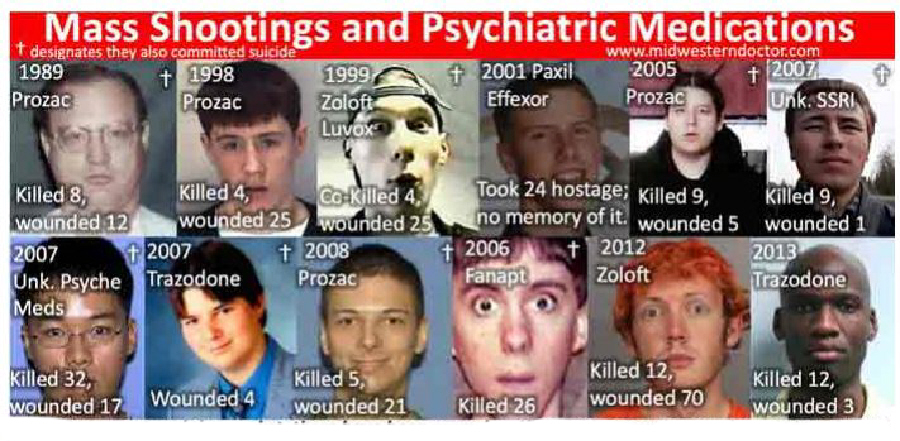- SSRI antidepressants have a variety of horrendous side effects. These include sometimes causing the individual to become agitated, feeling they can’t be in their skin, turning psychotic, and occasionally becoming violently psychotic
- During these psychoses, individuals can have out of body experiences where they commit lethal violence either to themselves or others
- As lawsuits later showed, this violent behavior (and the frequent suicides that followed it) were observed throughout the SSRI clinical trials, but were covered up by the SSRI manufacturers and then the drug regulators (e.g., the FDA)
- Once the SSRIs entered the market, there has been a wave of SSRI suicides and unspeakable acts of violence
- Sadly, the idea that SSRIs could cause any of this has always been viewed as a “conspiracy theory” or “mistaking correlation with causation” because very few are aware of the extensive evidence linking SSRIs to violent and psychotic behavior — despite it now being on the warning label of those drugs
Most holistic doctors consider Selective Serotonin Reuptake Inhibitors (SSRI) anti depressants to be one of most harmful mass-prescribed drugs on the market (it typically makes their top 5). However unlike the other drugs, which are just unsafe and ineffective, SSRIs also have a fairly unique problem — they can kill people who are not even taking the drugs.
Since SSRIs first entered the market, many have noticed the unusual correlation between their consumption and completely out of character violently psychotic behavior, such as extremely disturbing homicides or suicides being committed by the individual.
As the years have gone by, more and more evidence has accumulated (e.g., through lawsuits against the drug companies) that SSRIs cause psychotic violence, and in parallel, as the usage of these drugs has spiked, more and more grisly killings have occurred.
As you might imagine, there are many taboo areas in medicine (e.g., suggesting that vaccines can cause neurological damage to children). However, out of all of them, I’ve found by far the most hostility is directed towards anyone who insinuates mass shootings may be linked to SSRIs (e.g., I got in quite a bit of professional trouble for doing this in the past).
Since that time, other prominent conservatives have spoken out on this issue (e.g., Rep. Marjorie Taylor Greene). Conversely, the horror of the “far-right hysteria against SSRIs” has become a talking point of the left (e.g., see this Huffington Post piece and this Slate piece) — something I suspect is due to the high rates of psychiatric medication usage in the modern left and big Pharma buying out the Democratic party during Obama’s presidency.
Fortunately, those attacks did not work, and the violent risks of SSRI’s have gradually become more acceptable to talk about (e.g., RFK Jr. has mentioned them during his presidential campaign and not backed down when challenged on the point). In turn, each time a mass shooting happens, the same script is repeated (we need to ban all guns and have more mental health care [i.e. psyche meds] for everyone). Fortunately, this script is losing its appeal and SSRIs are more and more frequently being mentioned each time a mass shooting happens.
Having watched this dynamic play out for decades, it’s hard for me to put into words how monumental of a change this newfound awareness of the dangers of SSRIs is.
The only comparable example I can think of are many people now being open to considering the dangers of childhood vaccination — something which has taken a century to bring into the public awareness (e.g., my friends who gave everything they had to speak out in the 1980s and 1990s on vaccine safety were almost completely alone and cannot believe just how much the public’s receptivity to this message has changed in the last few years).
Correlation or Causation?

One of the most common arguments used to dismiss the link between SSRIs and psychotic violence is that people who are mentally ill are more likely to be on psyche meds, so the “correlation” between psyche meds and psychotic violence is simply a product of pre-existing mental illness and would have happened independently of the psyche med.
However, while claiming “correlation is not causation” makes it possible to refute this link while sounding intelligent in the process, there are a few major problems with this argument.
First, there is a lot of evidence tying SSRI usage to these events, including clinical trial data that was hidden from the public. Since that evidence was not covered in Tucker or Walsh’s presentation, it will be the focus of this article. Second, there is a black-box warning on the SSRIs for them increasing the risk of suicide, something which can only be possible if some degree of causation does in fact exist.
Third, these psychotic events are completely out of character for the individuals who commit them, and in many cases they report a very similar (and disconcerting) narrative of what they experienced prior to and during the shooting.
Note: Big Pharma, working hand in hand with the FDA fought tooth and nail for decades to prevent a warning from ever being added to the SSRIs. I believe this is in part due to how much money is made off of these drugs (presently their sales make approximately 40 billion dollars a year).
The SSRI Era
Selective serotonin reuptake inhibitors (SSRIs) have a similar primary mechanism of action to cocaine. SSRIs block the reuptake of Serotonin, SNRIs, also commonly prescribed block the reuptake of Serotonin and Norepinephrine (henceforth “SSRI refers to both SSRI and SNRI), and Cocaine blocks the reuptake of Serotonin, Norepinephrine, and Dopamine.
SSRIs (and SNRIs) were originally used as anti-depressants, then gradually had their use marketed into other areas and along the way have amassed a massive body count.
Once the first SSRI entered the market in 1988, Prozac quickly distinguished itself as a particularly dangerous medication and after nine years, the FDA had received 39,000 adverse event reports for Prozac, a number far greater than for any other drug.
This included hundreds of suicides, atrocious violent crimes, hostility and aggression, psychosis, confusion, distorted thinking, convulsions, amnesia, brain-zaps, a feeling that your brain longer works right, and sexual dysfunction (long-term or permanent sexual dysfunction is one of the most commonly reported side effects from anti-depressants, which is ironic given that the medication is supposed to make you less, not more depressed).
This is an excerpt of the article, you can download the full article with references, links and images in PDF format here.


